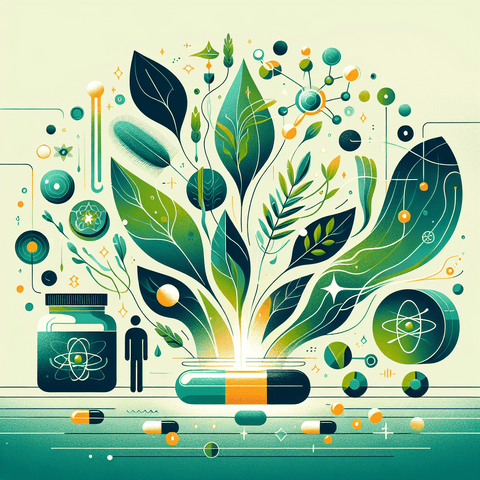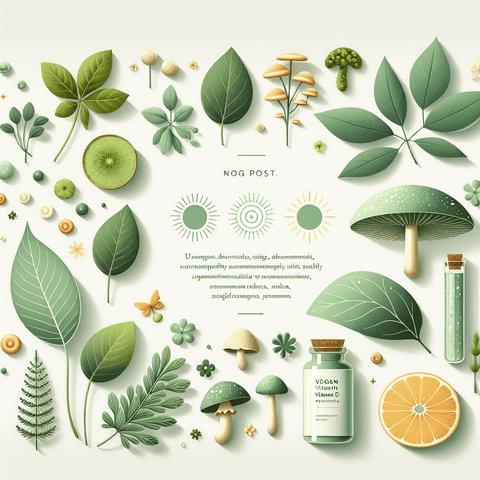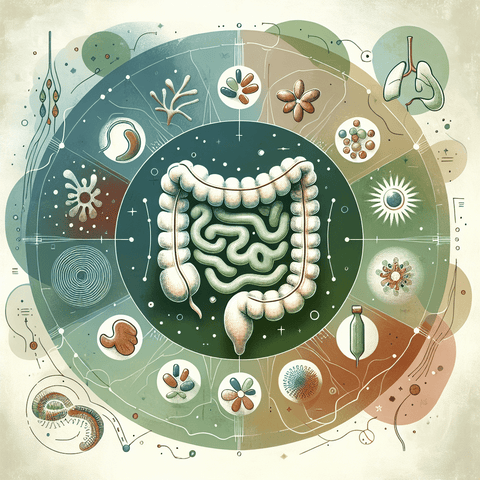Introduction
Vitamin B12, also known as cobalamin, is a crucial nutrient that plays an indispensable role in human health. It is fundamental for neurological function, red blood cell production, DNA synthesis, and overall vitality. Despite its importance, one of the most common nutritional challenges faced by vegans and those following plant-based diets is obtaining adequate B12 levels, primarily because this vitamin is predominantly found in animal-derived foods. Consequently, many individuals mistakenly believe that plant foods cannot provide meaningful B12 sources, leading to misconceptions and potential deficiencies.
This article aims to explore and unveil lesser-known plant-based sources of B12, highlighting natural foods, fortified options, and supplements designed for those who choose a plant-centric lifestyle. By understanding the available options, how to incorporate them effectively, and the scientific basis behind these sources, you can confidently navigate maintaining optimal B12 levels naturally—thus supporting your health, vitality, and ethical commitments.
1. Plant-Based B12: Rethinking Myth Busting and Nutritional Supplement Strategies
Vitamin B12 is essential for fundamental biological processes, particularly neurological health, energy metabolism, and red blood cell formation. A deficiency can lead to serious neurological issues, anemia, fatigue, and impaired cognitive function—conditions that can significantly diminish quality of life. For vegans and plant-based enthusiasts, attention to B12 intake is vital because their diet excludes the primary natural sources of cobalamin: animal products like meat, eggs, and dairy.
Historically, misconceptions have persisted that plant foods lack B12 entirely. While it's true that most unfortified plant foods like fruits, vegetables, grains, and legumes do not naturally contain vitamin B12 in bioavailable forms, recent research and technological advancements challenge this notion. Some fermented foods and algae may contain B12-producing bacteria or analogs, but their bioavailability and suitability as sole sources are subjects of scientific scrutiny. To bridge nutritional gaps, supplement strategies—including fortified foods and reliable vegan B12 supplements—are often recommended.
For individuals on plant-based diets, understanding that reliable sources include fortified foods (plant milks, cereals, nutritional yeast) and supplements is crucial. These options are designed to reliably supply active B12 forms, ensuring the body can meet its health requirements. Combining dietary diversity with supplementation, along with regular B12 testing, forms a comprehensive approach for maintaining optimal B12 status naturally—and effectively.
2. Discovering Plant-Based B12 Foods, Vegan B12 Sources, and Natural B12 from Plants
While traditional plant foods are generally not rich sources of active B12, certain foods and natural options stand out for their B12 content or potential contribution. Emerging research highlights the roles of fermented foods, seaweeds, microalgae, and fortified products as key components in a vegan B12 strategy.
Fermented foods like tempeh and some miso varieties are often cited for their potential B12 content. Tempeh, a fermented soybean product, undergoes fermentation processes involving bacteria that may produce B12. However, the B12 amount can vary widely depending on fermentation conditions, making it unreliable as a sole source. Consuming dried or fermented tempeh occasionally can supplement dietary intake, but it’s best combined with fortified foods or supplements.
Seaweed varieties such as nori, wakame, and kelp are popularly believed to contain B12. Nori, in particular, has shown some B12 content in research, and its bioavailability appears promising. Nonetheless, the amount varies by cultivation and processing, and some B12 analogs in seaweed may not be active or beneficial in humans. Therefore, seaweed can be a supplementary source but should not solely be relied upon.
On the frontier of plant sources, microalgae such as spirulina and chlorella have garnered attention. Spirulina is famed for its nutrient profile but is known to contain mostly B12 analogs, which do not activate the B12 pathway in humans. Chlorella’s B12 content is also debated—some studies suggest it contains active B12, while others find it predominated by analogs. Thus, caution and further validation are essential.
Other plant-based foods, like certain legumes, grains, and vegetables, may contain trace amounts of B12—often due to bacterial contamination or fortification. However, these are generally insufficient to meet daily requirements without supplementation.
In summary, while some traditional and emerging plant foods contain B12 or B12-like compounds, their bioavailability and efficacy are variable. The best approach involves consuming fermented plant foods, seaweeds, and algae as part of a diverse diet, complemented by fortified products or supplements to meet daily B12 needs.
3. B12 Deficiency Plant Options: How to Identify and Incorporate Them Effectively
Recognizing signs of B12 deficiency—such as fatigue, weakness, neurological symptoms like numbness or tingling, cognitive disturbances, and anemia—is key for proactive health management. Vegans and individuals on plant-based diets are at higher risk, particularly if they do not regularly include fortified foods or supplements. Moreover, certain groups like pregnant women, older adults, or those with absorption issues require careful attention.
Fortified plant foods are considered the primary natural source of B12 for vegans. These include plant-based milks, breakfast cereals, nutritional yeast, and plant-based yogurts. When selecting fortified foods, it's essential to check the label for actual B12 content—aiming for amounts that contribute meaningfully toward daily needs (generally 2.4 micrograms for adults). Quality assurance and consumer transparency ensure that you are obtaining a bioavailable form, such as methylcobalamin.
Beyond food choices, B12-enriched vegan products like vegan deli slices, snack bars, or B12-added nutritional yeast can serve as easy ways to regularly boost B12 levels. Incorporating them into meals—such as adding nutritional yeast to pasta, smoothies, or salads—can seamlessly integrate B12 into your diet.
For long-term adequacy, regular lab testing of B12 status is recommended. Blood tests measuring serum B12 and methylmalonic acid (MMA) levels help ensure that you are maintaining sufficient levels. Combining dietary intake with supplementation, especially during periods of increased risk (like pregnancy or illness), promotes overall health and prevents deficiency.
Ultimately, variety and consistency are vital. Regularly rotating fortified foods, natural sources, and supplements create a balanced approach, making it easier to meet daily B12 needs without relying solely on one source.
4. Vegan B12 Sources and Natural B12 from Plants: The Scientific Perspective
The scientific community has long investigated the existence and bioavailability of B12 in plant foods. Historically, the consensus was that plants do not naturally produce B12, and deficiencies among vegans were inevitable without supplementation. However, recent studies have challenged this perception, highlighting complex interactions involving bacteria, fermentation processes, and bioactive compounds.
Research indicates that certain bacteria associated with plant surfaces and fermentation processes can produce measurable amounts of B12. For example, in fermentation-based foods like tempeh and some miso, bacterial synthesis of B12 is possible. Yet, the variability in bacterial strains, fermentation conditions, and storage affects the consistency of B12 content. Moreover, B12 analogs—compounds resembling active B12—may be present but lack biological activity, or worse, interfere with B12 metabolism.
Active B12 in foods exists predominantly in its adenosylcobalamin and methylcobalamin forms—both vital for human health. The challenge lies in ensuring that naturally occurring or fermented foods contain these bioactive forms at sufficient levels. Advances in cultivating B12-producing bacteria and genetic modification of plants to harbor B12 biosynthesis pathways are promising areas of scientific innovation.
Bioavailability remains a core concern—just because a food contains B12 does not mean it is readily absorbed and utilized. The presence of B12 analogs complicates this, as some analogs may interfere with B12 metabolism or absorption. Therefore, while scientific breakthroughs continue to emerge, the current best practice remains to rely on fortified foods and supplements validated by research.
This scientific exploration underscores the importance of ongoing research, quality control, and innovation to harness plant-based B12 sources effectively and safely.
5. Plant-Derived B12 Supplements: A Safe and Reliable Solution for Vegans
Considering the variability and limitations of natural plant sources, plant-derived B12 supplements have become the gold standard for vegans aiming to maintain health and avoid deficiency. These supplements predominantly contain active, bioavailable forms such as methylcobalamin, adenosylcobalamin, or hydroxocobalamin, often derived through fermentation processes involving bacteria.
Advantages of plant-based B12 supplements include consistent B12 content, proven bioavailability, and the absence of potentially ineffective analogs. They are formulated specifically for vegan consumers and are available in various forms—capsules, sublingual tablets, liquids, or sprays—facilitating flexibility in intake. When choosing supplements, look for products that clearly specify their B12 form, dosage, and certification to ensure purity and efficacy.
Supplementation guidelines recommend a daily intake of approximately 2.4 micrograms of B12 for adults, with some experts suggesting higher doses for pregnant or breastfeeding women. Sublingual forms or sprays offer rapid absorption, although the scientific consensus indicates that any form—if active B12—is generally effective when taken regularly.
Addressing common myths, plant-derived B12 supplements are as safe and effective as synthetic options, provided they contain genuine, active forms of B12. They are free from animal ingredients, making them suitable for vegans and vegetarians alike. Quality assurance certifications and third-party testing provide additional confidence in product safety.
Implementing a routine with high-quality vegan B12 supplements, alongside a diverse diet, ensures a reliable foundation for maintaining healthy B12 levels. Regular monitoring and consultation with healthcare professionals further optimize long-term health outcomes.
Conclusion
Understanding the diverse and evolving landscape of plant-based B12 sources is vital for vegans and those committed to a plant-centered lifestyle. While natural plant foods may offer some B12 or analogs, their bioavailability and sufficiency vary greatly. Fortified foods and scientifically validated supplements remain the most reliable options to ensure adequate intake.
Incorporating a combination of B12-rich fortified foods, occasional natural sources like seaweed and algae, and high-quality vegan supplements can effectively bridge any nutritional gaps. Equally crucial is regular B12 testing and professional guidance, which helps tailor dietary strategies to individual needs.
By embracing innovative, science-backed solutions, plant-based eaters can confidently maintain optimal B12 levels and enjoy the numerous health benefits associated with this essential vitamin. The future of plant-based B12 solutions promises even greater advancements—so staying informed and proactive is your best strategy for health and well-being.
Q&A Section
Q1: Are plant foods naturally rich in vitamin B12?
Most unfortified plant foods do not naturally contain active vitamin B12 in significant amounts. Some fermented foods, seaweeds, and microalgae may contain B12 or analogs, but their bioavailability and reliability vary. For consistent nutritional adequacy, fortified foods and supplements are recommended.
Q2: Can I rely solely on seaweed or algae for B12?
Seaweed and algae can contribute to B12 intake, but their B12 content and bioavailability are inconsistent and sometimes contain inactive analogs. They should complement, not replace, fortified foods or supplements for meeting daily B12 requirements.
Q3: What is the most reliable way for vegans to ensure adequate B12 levels?
The most dependable approach is consuming fortified foods regularly and taking high-quality vegan B12 supplements containing active forms like methylcobalamin or adenosylcobalamin. Routine blood tests help monitor B12 status.
Q4: Are plant-based B12 supplements safe?
Yes, plant-derived B12 supplements are safe, effective, and suitable for vegans. They are formulated with bioavailable active B12 compounds, and their safety is confirmed by scientific research and quality certifications.
Q5: How often should I test my B12 levels?
It’s recommended to test B12 status at least annually, or more frequently if you experience symptoms of deficiency, are pregnant, elderly, or have absorption issues. Regular monitoring helps tailor your diet and supplement regimen effectively.
Important Keywords
- Plant-based B12 sources
- Vegan B12 supplements
- Fortified plant foods
- Seaweed rich in B12
- Vegetarian B12 options
- Microalgae B12
- Natural B12 in plants
- B12 deficiency prevention
- Bioavailable B12 forms
- Vegan nutrition



